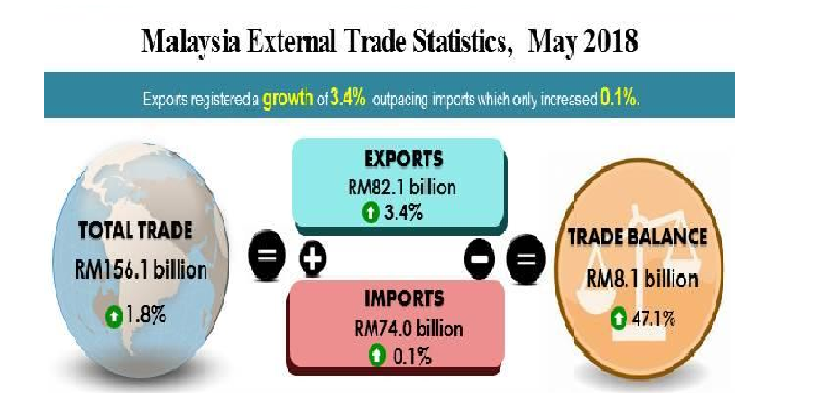KUALA LUMPUR: Malaysia’s exports for May 2018 grew 3.4% year-on-year (y-o-y) to RM82.1bil underpinned by to higher exports of liquefied natural gas (LNG) crude petroleum and electrical and electronic (E&E).
However, the growth was a sharp contrast with Bloomberg’s survey of an 6.4% increase. Bloomberg forecast of a 0.2% growth in imports.
According to the Statistics Department on Thursday, exports in May 2018 which was valued at RM82.1bil, is the fifth consecutive month where export growth had outpaced imports.
Re-exports was valued at RM16.3bil registering an increase of 21.4% y-o-y and accounted for 19.8% of total exports. Domestic exports was lower by 0.3% decreasing RM178.0mil to RM65.9bil.
Imports in May recorded a marginal increase of 0.1% y-o-y to RM74bil.
On a month-on-month (m-o-m) basis, exports recorded a decrease of 2.5% or RM2.1bil from RM84.2bil. In seasonally adjusted terms, exports also shrank 3.3%.
The Statistics Department said total trade which was valued at RM156.1bil increased RM2.8bil or 1.8% from a year ago. It also posted a growth of RM631.8mil or 0.4% when compared to the previous month.
The trade surplus was RM8.1bil, an expansion of RM2.6bil (+47.1%) from a year ago. However, when compared to the previous month, it fell RM4.9bil or 37.7%.
Commenting on the exports in May, the department said LNG, which accounted for 3.8% of total exports expanded RM1.2bil or 61.0% to RM3.1bil due to the increase in export volume (+68.7%) as average unit value decreased 4.6%.
Crude petroleum, which contributed 3.8% to total exports increased RM975.3mil or 45.8% to RM3.1bil due to the increase in both average unit value (+22.2%) and export volume (+19.3%) while refined petroleum products rose RM649.4mil or 10.0% to RM7.1bil.
E&E products (35.5% of total exports), increased RM608.3mil (+2.1%) to RM29.2bil.
However, palm oil and palm oil-based products (7.0% of total exports), dropped RM1bil (-15.4%) to RM5.8bil. Exports of palm oil, the major commodity in this group of products declined RM1bil or 24.2% due to the decrease in both export volume (-14.5%) and average unit value (-11.4%).
The department said on a y-o-y basis, imports increased marginally by 0.1% to RM74bil mainly attributed to intermediate goods, capital goods and consumption goods.
Intermediate goods which constituted for 54.1% of total imports fell RM2.3bil (-5.3%) to RM40.1bil. The decrease was mainly attributed to parts and accessories of capital goods (except transport equipment) (-RM1.8bil, -11.3%), industrial supplies, processed (-RM1.3bil, -7.8%) and fuel & lubricants, processed, other (-RM1.1bil, -41.2%). However, fuel & lubricants, primary increased RM2.2bil or 125.4%.
Imports of consumption goods which constituted for 8.1% of total imports recorded a decrease of RM678.1mil (-10.2%) to RM6bil. This is mainly due to semi-durables (-RM322.9mil, -21.0%), food & beverages, primary, mainly for household consumption (-RM112.1mil, -12.3%) and non-durables (-RM100.5mil, -6.4%).
Imports of capital goods, which accounted for 13.3% of total imports, declined RM65.5mil (-0.7%) to RM9.8bil due to the decrease in capital good (except transport equipment) (-RM1.3bil, -15.3%). However, transport equipment, industrial increased RM1.3bil or 105.6%.
On a m-o-m basis, imports rose RM2.8bil or 3.9% from RM71.2bil.
Get 30% off with our ads free Premium Plan!







